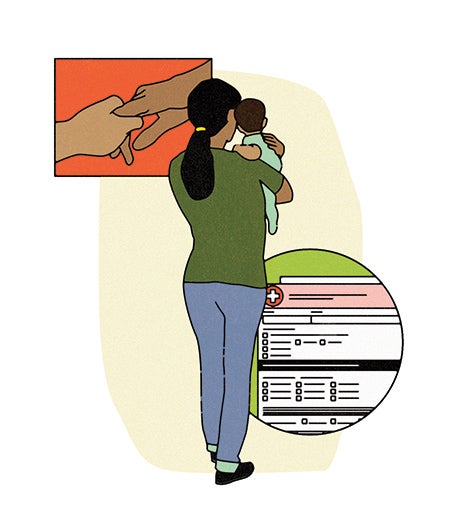Covid, Compounded
For undocumented Latino families in the U.S., chronic daily stressors compromise health and well-being.

Summer 2023
By Amy McCaig
The COVID-19 pandemic caused a disproportionate amount of illness and death among Latino families lacking permanent legal status or with mixed documentation status compared with the general U.S. population — and factors such as poverty, dangerous living conditions and lack of access to health care are to blame, according to a study published recently in the Journal of Clinical Child and Adolescent Psychology.
The study’s lead author, Luz Garcini, a clinical psychologist with a master’s in public health, focuses her research on the health care of historically marginalized communities, seeking to identify, understand and address their needs from a behavioral and sociological perspective. For this study, she led a team of researchers who are all immigrants; three of them are Latinos who speak Spanish as their first language.
The team assessed families residing in South Texas near the U.S.-Mexico border, conducting a series of interviews with the participants and producing a narrative summary about what respondents believed impacted their health and well-being during the pandemic. The answers included economic changes and financial losses, such as being forced to change jobs to those with less pay, longer hours, denial of time off and high-risk exposure to COVID-19. Another issue was social disadvantage and discrimination fostered by an amplified narrative depicting immigrants as dangerous, disease-carrying and an economic burden. Additionally, limited access to health care affected their ability to seek treatment during the pandemic, which they believe resulted in more illness and death in their community.
It’s essential that mental health, medical and other allied health professionals are aware of the hardships and oppression faced by these immigrant families.
These stressors also frequently come with trauma and the fear of detention, deportation and family separation, says Garcini, and these concerns affect every aspect of their lives. To minimize the risk of exposure, families often avoid seeking health services, remain silent about crimes and abuses against them, and forgo employment and investment opportunities that could have supplied them with greater stability.
“It’s essential that mental health, medical and other allied health professionals are aware of the hardships and oppression faced by these immigrant families,” Garcini says. “And it’s vital to expand culturally sensitive services and policies that would increase equal access to health and other support services.”
The study recommended that services strive to build upon the natural resilience of this population, broaden support networks through organizations such as faith-based institutions and community advocacy agencies, increase access to mental health care through options such as telehealth and self-guided care, and improve the cultural awareness and competency of health providers.
Luz Garcini is an assistant professor of psychological sciences and faculty scholar at the Baker Institute for Public Policy.
